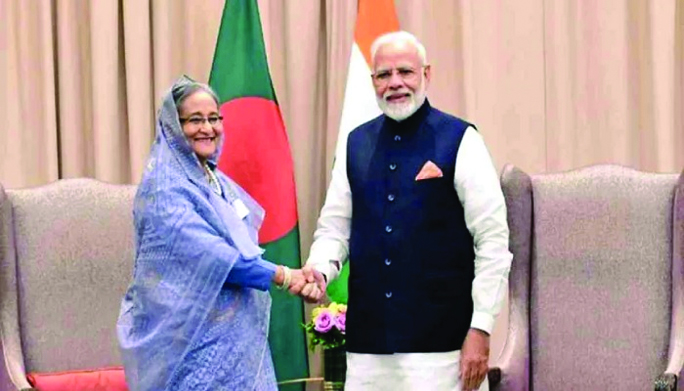
Abu Jakir :
A wave of dissent has swept through country’s political landscape following Prime Minister Sheikh Hasina’s recent visit to India.
Major opposition parties, including the Bangladesh Nationalist Party (BNP), have launched a scathing critique of the agreements signed during the visit, raising serious concerns about their impact on the nation’s well-being.
The crux of the opposition’s argument centers on transparency. The leaders vehemently demand a full disclosure of the agreements, memorandums of understanding, or any understandings reached between Prime Minister Hasina and her Indian counterpart, Narendra Modi. They assert that such transparency is not just a matter of good governance, but a constitutional obligation.
Beyond concerns about openness, the opposition parties express deep anxieties regarding the potential consequences of these agreements.
They warn that the deals could be detrimental to Bangladesh’s independence and sovereignty, labeling them “anti-state.” The opposition leaders raise critical questions about the actual benefits these agreements offer to Bangladesh, suggesting they might undermine the nation’s interests.
In a display of political unity, the opposing parties have joined forces in demanding transparency. They emphasize the public’s right to know the details of agreements that could significantly impact their lives. They warn against any secret deals that prioritize external interests at the expense of Bangladesh’s national well-being, asserting that the public will not tolerate such a scenario.
During her recent trip to India, Prime Minister Hasina signed 10 Memoranda of Understanding (MoUs), including one for rail transit. If implemented, this agreement would allow India to transport goods directly from one part of the country to another through Bangladeshi territory.
Speaking to this correspondent, BNP’s senior joint secretary general, Ruhul Kabir Rizvi Ahmed, criticised the agreements signed by the Awami League government with India, describing them as anti-state and against the interests of the Bangladeshi people. “The government is completely failing to realize the demands from India,” he said.
“Our party, the BNP, rejects these agreements as they go against the interests of Bangladesh. I want to say clearly that the BNP was created to protect the sovereignty of the country, and we will take all necessary measures to safeguard our independence and sovereignty.” Recently, Hefazat-e-Islam Bangladesh’s Amir, Allama Shah Muhibullah Babunagari, issued a statement regarding the signing of the 10 agreements and memorandums of understanding with the Modi government during the Prime Minister’s visit to Delhi.
In the statement, Shah Muhibullah Babunagari asserted that the people of Bangladesh would not accept any anti-national agreements or understandings with the Modi government.

“Prioritising India’s interests over our own is not friendship but rather akin to servitude. We have seen such instances of servitude in the past to maintain power unlawfully.
However, the outcome of servitude is never honorable. It will be consigned to the dustbin of history.” The Left Democratic Alliance has also demanded transparency regarding the agreements made between Prime Minister Sheikh Hasina and Indian Prime Minister Narendra Modi.
In a meeting on Tuesday, the alliance leaders called for the immediate cancellation of the decision to grant India a railway corridor and urged the finalization of a water-sharing agreement to secure a fair share of Teesta River water.
The AB Party has similarly condemned the agreement allowing Indian trains to operate through Bangladeshi territory without public consent, calling it a conspiracy against sovereignty.
The party leaders alleged that the government has signed unfair agreements and memorandums of understanding with India. These accusations were made at a press conference held at the party’s central office in Bijoynagar, Dhaka, on Monday. Tajul Islam, the party’s Joint Convenor, stated, “We strongly condemn the anti-people agreements made by the government with a neighboring state while keeping the people of Bangladesh in the dark.
Article 145 of the Constitution of Bangladesh states that any agreement with a foreign state must be presented in Parliament. However, the Awami League has never done this.”
Mahmudur Rahman Manna, president of Nagorik Oikya, expressed similar concerns, pointing out the potential security risks of allowing Indian trains to travel through Bangladesh.
“Is this called transit? This is called a corridor. What if weapons or soldiers are transported on these trains? Will you be able to inspect them? India now wants to create a route to the Seven Sisters region through Bangladesh,” he said at a human chain organized by Nagorik Oikya in front of the National Press Club on Wednesday.
Manna criticised the government for surrendering too much to India, compromising the country’s sovereignty and security.
Leaders of the Rashtra Sanskar Andolan echoed these sentiments, stating that by granting transit, port, and trade facilities to India, Bangladesh’s security is at risk.
They accused India of deliberately working against Bangladesh’s political and democratic development. These comments were made by the national executive committee leaders of the Rashtra Sanskar Andolan at a press conference held at the party’s headquarters on Wednesday.
